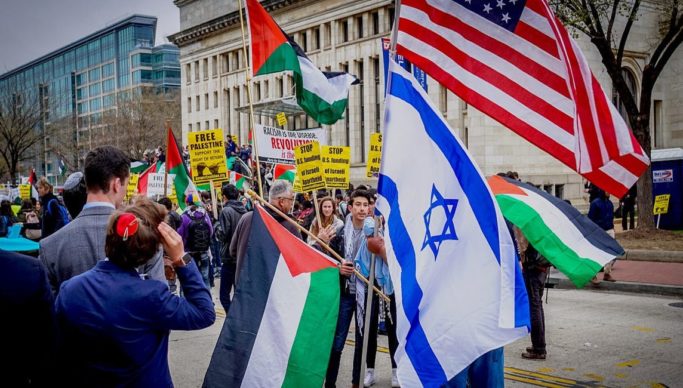
Chaplains Support Students Amid Campus Tensions During Israel-Hamas Conflict
- By Alison Lesley --
- 01 Nov 2023 --
As the war between Israel and the Palestinian terrorist group Hamas persists, tensions and security issues are extending to American university campuses, posing challenges for administrators, chaplains and faith leaders concerned about the safety of students caught up in competing demonstrations.
On October 26, at the Cooper Union for the Advancement of Science and Art, a private college in New York City, tense confrontations erupted between pro-Palestinian demonstrators and Jewish students who sought refuge at the campus library.
Some students, alongside leaders from the Jewish community, are now demanding the removal of Cooper Union’s president, alleging that the school did not adequately safeguard them.
At Rutgers University in New Jersey, Kaiser Aslam, the Muslim chaplain at the Center for Islamic Life, has been assisting students in addressing intricate queries and concerns.
The issues, mirroring those on other college campuses that have large Muslim and Jewish student bodies as well as international students, range from inquiries about the existence of suffering to worries about whether the students’ public support for Palestinians or criticism of Israel might impact their future career prospects or lead to other consequences.
“Some students are getting very significantly involved,” the Associated Press quoted Aslam as saying in an October 28 article. “I want to be mindful for them to take care of themselves.”
For those experiencing fear or uncertainty, Aslam provides reassurance that their voice is significant, and that there are constructive ways to remain engaged while drawing strength from their faith.
Meanwhile, Esther Reed, a rabbi at the Hillel chapter of Rutgers, recently conducted a listening session in which counseling experts engaged in discussions with Jewish students about techniques for managing stress and maintaining their mental well-being.
The rabbi remembered consoling a student who was inconsolable, having learned that a friend was killed in Israel during the October 7 attacks carried out by Hamas militants, which ignited the most recent hostilities. Reed said another student requested police to accompany her from her classes to her dormitory, expressing fear of walking alone.
“We have students with family members in Israel, friends in Israel,” Reed explained. “These are people we know; it’s not abstract.” She added: “It’s been exhausting. We have our own worries and fears and family members and perhaps losses and so there’s the weight of caring for our students on top of our own concerns.”
Although tensions have largely manifested along political rather than religious lines among those impacted by the war—with rival sides backing the Israeli nation or the Palestinian right to their own state—Reed pointed out that there are Jewish students who sympathize with the Palestinian cause, and there are Muslims who are concerned about the loss of Jewish lives.
Religious leaders from various faiths at Rutgers expressed different views on the potential benefits of convening individuals with differing perspectives for a group discussion.
Aslam said that he, along with some like-minded individuals, believes that dialogue can and should occur during this delicate period. “We don’t need to just protect our students,” he said. “I want our students to grow in understanding that others are feeling pain, anger and insecurity.”
For her part, Rabbi Reed expressed her willingness to facilitate discussions among people but acknowledged that it currently feels emotionally charged.
She mentioned that if Israel were to escalate its ground offensive in Gaza, and casualties continue to rise on both sides, it will become challenging for people to engage in a meaningful exchange of each other’s experiences “in the middle of it.”


















